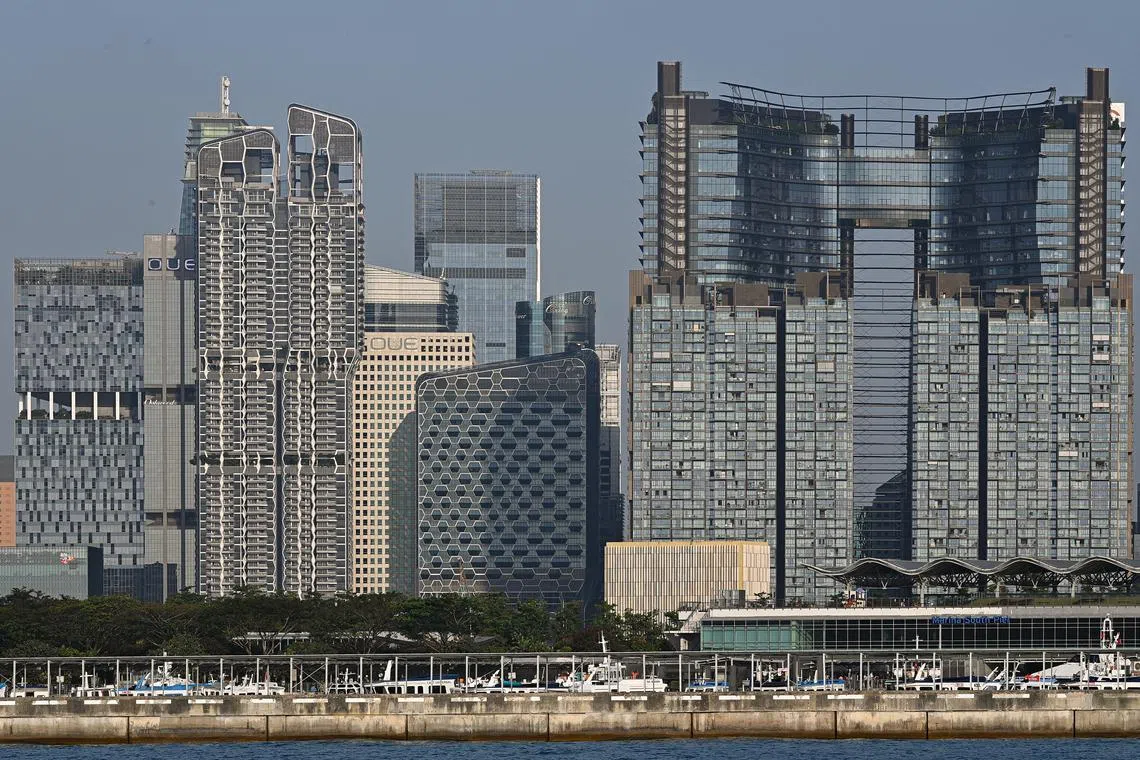Having longer-term outlook allows super rich families to ride out geopolitical risks: Goldman Sachs
Sign up now: Get ST's newsletters delivered to your inbox

Without external investors and strict mandates, family offices are able to stay invested through market downturns, Goldman Sachs said.
ST PHOTO: LIM YAOHUI
Follow topic:
- Family offices, managing wealth for the super-rich, demonstrate resilience in turbulent markets due to long-term capital and investment flexibility.
- Geopolitical conflict is a top investment risk, especially in Asia Pacific, while economic protectionism and tariffs are also major concerns.
- AI and digital assets, particularly cryptocurrencies, gain traction in family office investment, alongside sports as a growing investment theme.
AI generated
SINGAPORE - Family offices are emerging as standouts in today’s turbulent markets, with their long-term capital giving them the resilience to ride out volatility and the firepower to seize opportunities ahead of the pack.
Without external investors and strict mandates, family offices – which manage the wealth of super rich families – are able to stay invested through market downturns, Goldman Sachs said in its third Family Office Investment Insights report released on Sept 10.
The report, which included responses from 245 family office decision-makers worldwide between May 20 and June 18, noted that their advantage lies in being able to pursue investments that may take a decade or more to deliver returns.
This was evident from their investments in long-term projects such as healthcare and technology innovations, energy transition and long-duration infrastructure.
“Perhaps the most striking impression is how consistent the behaviours of family offices are over time, despite the noise around geopolitics, trade policy, and rapidly evolving technology,” it said.
Among the respondents, 47 per cent are from the Americas, 26 per cent Europe, the Middle East and Africa (EMEA), and 27 per cent the Asia-Pacific. More than two-thirds of the respondents have a net worth of at least US$1 billion (S$1.3 billion).
Since Goldman Sachs last polled family office investors for its report in 2023, the global landscape has changed, with escalating international tensions, policy shifts and the looming threat of trade wars.
Geopolitical conflict was the most cited investment risk, notably in the Asia-Pacific where 75 per cent of respondents cited it among the top three risks. The other two were political instability and economic recession.
Global tariffs were also among the most cited investment risks. Concerns about tariffs were highest in the Asia-Pacific, with the US putting pressure on its largest trading partners,
Seventy-seven per cent of family offices globally expect economic protectionism to increase and 70 per cent anticipate the average global tariff rate will be the same or higher, suggesting a perception that higher tariffs have become the new normal.
In the Americas, 34 per cent of family offices cited inflation as a top investment risk, compared with 25 per cent in EMEA and 17 per cent in the Asia-Pacific.
Despite these risks, the report indicated that the fundamental drivers of global growth and long-held investment themes remain intact, with family offices continuing to demonstrate their willingness to navigate the uncertainty.
Global asset allocation has remained largely unchanged between 2023 and 2025.
Public equity allocations inched up after dipping in 2023 to return to 2021 levels alongside a pullback in private equity, as muted exits weighed on commitments.
The biggest change was among family offices in the Americas that have the most capital allocated to private equity at 25 per cent versus 22 per cent in EMEA and 15 per cent in the Asia-Pacific.
Allocations to private real estate and infrastructure as well as private credit edged higher, underscoring demand for yield.
Private credit, in particular, emerged as a key growth area. The proportion of family offices without exposure to private credit fell to 26 per cent, from 36 per cent in 2023, as more sought to benefit from elevated rates and perceived downside protection, among other things.
Hedge fund allocations kept steady, but there was significantly more interest from family offices in EMEA and Asia-Pacific in allocating more to the asset class.
Regionally, portfolios remain anchored to the US. Outside their home base, family offices most often allocated funds to nearby markets: 89 per cent of EMEA respondents to the euro area and 80 per cent of Asia-Pacific respondents to China.
Cash holdings of family offices were also stable, allowing them to act swiftly on opportunities and meet capital calls.
Looking ahead to 2026, most family offices expect their portfolio allocations to remain unchanged. They have a broadly constructive view of the market and may be willing to increase risk in their portfolios across public and private equity.
Artificial intelligence (AI) plays an increasingly important role in how family offices are run and where they invest. Eighty-six per cent of family offices invest in AI, and 51 per cent already use AI in their investment processes, with a growing focus on secondary beneficiaries, the report said.
There is also growing interest in digital assets among family offices, with 33 per cent invested in cryptocurrencies now, compared with 26 per cent in 2023. This was led by Asia-Pacific, where 39 per cent are considering future allocations in digital assets. Globally, 11 per cent buy crypto to diversify risk.
Sports appear to be a growing investment theme among the super rich, with 25 per cent of family offices already invested in it and another 25 per cent interested; 71 per cent are focused on men’s major-league teams, while 61 per cent see sports media and content as the major driver of future value.


